|
TROLLENHAGEN and
THE U.S.A.
The Wolcott’s Visit!
This issue of the newsletter will be devoted to the trip
this summer which Chuck and Ruby Wolcott made to Germany. We are
indebted to them for the photos, video, journal entries and interview
they conducted with Pastor Gunther Schulz. This took place in our
ancestral village of Trollenhagen, north of Neubrandenburg in
Mecklenberg-Strelitz Germany. Another town they visited was Grischow,
which we believe was the home of Daniel Nierentz before he or his
children came to Trollenhagen.
Pastor Schulz (70 years old and now retired) had been
shepherding four church parishes for 40 years, one of which was
Trollenhagen. He gave them a tour of the church (built in the 1400s)
and cemetery, explained a little history of the area, played the organ
for them, conducted a divine service and sent along newspaper
clippings showing the repair of the church roof.
Since Trollenhagen had been part of the DDR (GDR) East
Germany, it was moving to hear him describe how communism had
devastated the soul by trying to remove God from culture. Yet we know
now that their efforts failed! The new Germany now exists.
In this unheated sanctuary people still gather to hear the
Word of God, receive the Sacrament and sing psalms and hymns of praise
to the Triune God!
The Nehrenz Families
Consider the price that Johann Christian Theodor Nehrenz
paid with his wife Maria Lempke and their children. He was a poor
farmer who joined thousands of Germans who were emigrating to go to
the new land of promise -America.
In October of 1869 he traveled to Hamburg and from there
sailed on the ship “Borussia” to New York (which probably went through
Liverpool, England along the way). He brought the younger children and
later his son Frederick and wife would come over in 1871.
They lived in Cleveland, Ohio (see February 1998 TNN issue)
and he was some type of day laborer. He never became wealthy and he
and his wife are buried in an unmarked grave. Yet we are now enjoying
the prosperity and wealth of the USA, while East Germans are still
trying to recover and rebuild their economy. Had he not come here, we
would still be over there. What a debt we owe him!
Editor: Dave Nehrenz
Inside This Issue
1. p. 1 -Cover page
2. pp. 2-4 -The Wolcotts’ journal
3. pp. 2-4 -Photos they took
4. pp. 5-6 -The Nehrenz Roster (send request
for this)
5. p. 7 -Your input needed!
The Church in Trollenhagen where our
Nehrenz ancestors were baptized, confirmed, married and buried.Here
are the stone walls and floors where their footsteps echoed and the
church bell which they heard ring as a call to worship. Here also is
the garden cemetery surrounded by golden fields of grain (and now also
apartment buildings!)
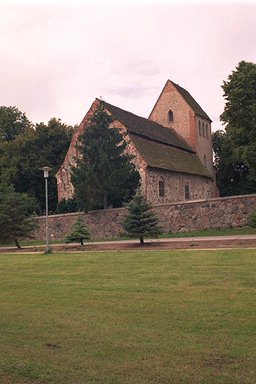
Excerpts from Ruby Wolcott’s Journal
Sunday, August 2, 1998
In Germany, nothing is open on Sunday, so we
knew this would be a day of relaxing and seeing things on our own. We
had hoped to attend a church service but since we did not get in until
2:00 a.m., we didn’t try. As in most of the smaller hotels, breakfast
is included in the room charge. We didn’t go to the dining room till
11:00, but they served us “breakfast” just the same. They brought a
tray with several different kinds of cheeses, cold cuts, packaged
sausages, juice, hard rolls and coffee. We realized the next day that,
just as in all the other hotels where we stayed, breakfast is a
buffet, but this was their special service to us since we came down
well past the breakfast hour.
Breakfast is the same no matter where you go,
There is always an assortment of cold cereals, cheeses, cold cuts,
juice, sometimes fresh fruit, an assortment of rolls and perhaps a
couple of large bowls of yogurt. I put the yogurt over fresh fruit but
some ate bowls of it. The only “official” hot meal of the day is the
noonday meal which is the main meal in Germany. However, they are
getting so westernized that when you go out in the evening, you are
served huge meals. The problem is, there are no lunch menus. Lunch is
also huge. But in the homes, a meal similar to breakfast is served for
the evening meal. No cooking is involved.
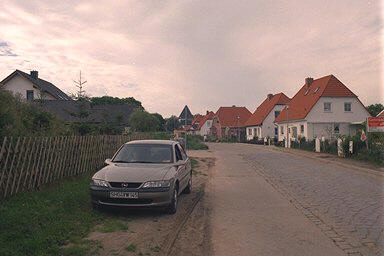
Today, (Sunday) we drove to Trollenhagen
on our own, found the church and walked around the cemetery,
taking pictures. It was raining, so the cemetery was quite muddy. No
sign of a Nehrenz stone! We also drove to the airport. It’s just a
small, community airport. It has commuter planes that probably take
people to larger airports. We did see underground bunkers that
probably housed artillery during the war. When we were there, there
was only one family there and they had no luggage, so we assumed they
were waiting for someone to come in.
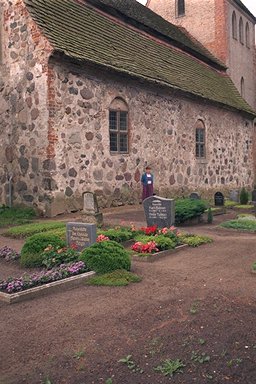
The conclusion drawn about Trollenhagen is
that it is just across from the airport, but probably was not altered
very much. There are still a few old houses there, but mostly they are
new. The communist-built apartment building sits just across from
the church on Dorf Road. We saw about three businesses in the
town, but these existed in the homes or on the home property. Across
from the church is a Getrankt store. Basically, a beverage store in a
private home. We saw a car repair shop and a restaurant. That was all.
I called Pastor Schulz to make arrangements
to meet him on Monday. He had to be in Trollenhagen the next day to
talk to the family of a person he had buried the previous Thursday so
we arranged to meet him at 10:00 a.m.
We had supper at the hotel restaurant. We had
“restaurant surprise.” That’s what I call our meals that we order
without having the vaguest idea what the menu says. For the most part
since we’ve been in Germany, the menus are pretty easy to decipher and
some have English translations. Not the menu here.
Monday, August 3
We met Pastor Schulz at the Trollenhagen
church at 9:30 a.m. this morning. We took lots of pictures and
video. The first part of the video can be boring because it’s full of
Pastor Schulz and me trying to understand each other. He is much
better at English than I am at German. He’s a very interesting,
exuberant man. Pastor Schulz conducted our own private church service.
He played a prelude, than we sang “The Church’s One Foundation,” with
us singing in English and Pastor Schulz in German. It was a good
feeling.
He then read scripture--Matthew 6:25 - 34.
“Consider the lilies. . .
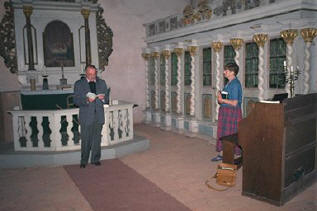
After that he pronounced the benediction “in
der name (nahme) der Vater, der Sohn and der Heiligen Geist.” We
really felt privileged to participate in this.
Pastor Schulz has been a pastor for 40 years
and is now retired. He helps a woman pastor serve 8 churches in the
area. He showed us a lot about the old church; where the aristocracy
sat, where the old sits in the balcony. It’s no longer used. Restoring
the old churches is a big task. Once he said they received a grant of
10,000 Deutsch Marks and they did a partial repair on the church roof.
They are hoping the government can help but there are so many, many
old churches in Germany.
The offering for any given Sunday is around
30 Marks, so obviously the people cannot restore these churches.
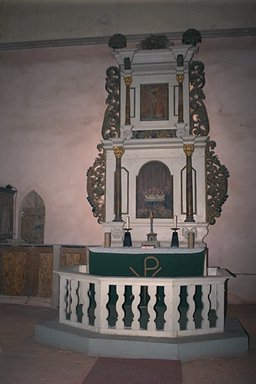
True to form, I left something behind in the
church, all my notes, and didn’t realize it until Pastor Schulz had
gone. To keep from bothering Pastor Schulz, we went back to the
village and saw a lady working in the garden by the church. I asked
her if she knew “Welche Frau hat der Schlüssel to die Kirche.”
Fortunately, I had learned the word for key. I told her I had “legen
mein Heft in die Kirche.” She understood what I was saying and said it
was “Edie” that had the key. Edie lived in the big apartment house
across from the church, so she took us there. Edie’s arthritis was
bothering her so she gave us the huge key to the 16th century lock.
When we returned the key, I talked to Edie for a little while. I asked
if she had lived in the area all her life. She said she was from
“Russo,” which I took to mean Russia. The ladies were amused at the
situation and we all had a good laugh.
He told us he has searched and asked other
people about the name “Nehrenz,” but he said it is not to be found in
Germany today. He said our family was very poor and worked for the
aristocracy. When the aristocracy disappeared, so did the means of
earning a living. This, no doubt, is why so many people emigrated to
America.
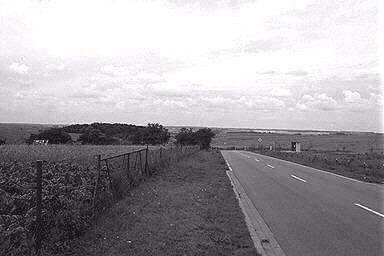
It is beautiful farming country so I
knew our ancestors had lived in a beautiful place. And, of course,
depending on the people they worked for, may have had a good life.
Probably all of Trollenhagen developed around the Manor House and
probably each small town developed the same way. A church, a manor
house and a village.
He said Communism “devastated the soul.” I
wondered how he had survived as a pastor all those years under
Communism. His answer was basically that the communists ignored the
church and thought it would eventually die out. I think worship was
done very unobtrusively. I invited Pastor Schulz to the United
States. He said he was too old and too busy. But he had a twinkle in
his eye.
I am amazed at all the open land. I know
Germany is not very big and there are so many people that live there,
so I didn’t expect this. I think the population is concentrated in the
big cities, leaving a lot of open farm land.
There are lots of cars and lots of tail-gaters,
but other than that bad habit, they seem to be very courteous drivers.
Tuesday, August 4
We went to Neubrandenburg, just to get the
feel of the town and take pictures of the four gates. We keep getting
side-tracked. Each gate has two “faces,” so to get a true picture of
each gate, we need an “inside” and “outside” the wall pictures. Oh,
well, we bought postcards and sketches of them.
The Germans love beer, wine, ice cream,
flowers and dogs. And their bikes. And the Neubrandenburgers are very
proud of Fritz Reuter, the Low German author. He lived in
Neubrandenburg for seven years and two of the books he wrote while
living there are recommended for anyone who wants to understand the
life and times of the 1800’s in that area. Both are out of print, but
can probably be gotten through inter-library loan. Also, Amazon Books
said to order through them and they will check with second-hand book
dealers to see if they can locate them. The two books are, “My
Apprenticeship,” and “When the French Were Here.”
There are Fritz Reuter restaurants, streets
named for him, many statues and a room at the Regional Museum is
dedicated to him.
We met a nice couple at the hotel. They live
in Potsdam. As best we could, we talked about the Berlin wall coming
down. I think the Germans want to forget that time in their history
but it’s obvious they still need to talk about it. We exchanged names
and addresses and hope to stay in contact with them.
Ruby by gravestones 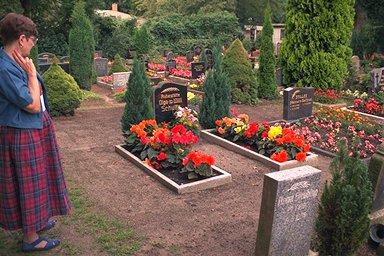
Note: A big thanks to both Chuck and
Ruby for being so generous in sharing their trip with us! Ruby for the
journal entries and Chuck for all the great photos and video!
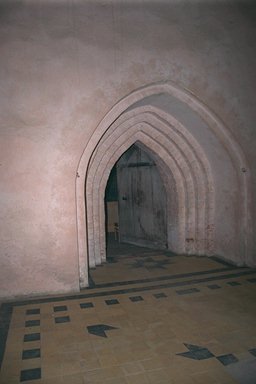 The
Church Door The
Church Door
Thursday, August 6
Spent 1/2 day in the library searching for
Nehrenz info. There is much history on the area, but didn’t find
anything I could use, till I saw sets of biographical encyclopedias. I
feel with time, a lot of information could be found in this city
library. And so much more in a major library such as the one in
Berlin.
We discovered there are no old tombstones in
the cemeteries. I think we expect the rest of the world to be like
America. I’ve walked through many New England cemeteries and saw
graves where men were buried next to their young children and
sometimes three wives. But that isn’t found in Germany. Most of the
graves are no more than fifty years old. This is a mystery to be
solved.
We met another nice couple in the hotel
dining room. They were so excited to be there because as she said,
“This is all new to us. When the wall was up, we couldn’t come here.”
They were visiting their son who is a surgeon in Neubrandenburg. He
doesn’t have time to come home, so they came to the Heidehof and after
work, he would come to visit them. We exchanged names and phone
numbers with them also. The best part of a trip is the nice people you
meet.
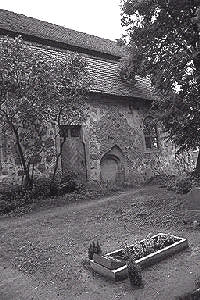 The old church side door
The old church side door
For two nights I’ve tried to figure out what
the little round balls were that people were ordering for appetizers.
I thought it must be something exotic. This afternoon I borrowed a
menu to study in our room so I would know what we were ordering for
supper. Chuck had already decided on schnitzel again, but I wanted
something different. I ordered baked chicken breast which turned out
to be excellent and one of the things that came with it were “potato
puffers,” the little round balls I had wondered about. They were
essentially deep-fried mashed potato balls. Not healthy, but they sure
tasted good.
We feel at this point, Heidehof is an
undiscovered get-away. It is so nice and we would certainly stay here
again. I’m afraid it won’t stay hidden for long.
One thing I love about Germany are the
individual down comforters. Even if you have one king-sized bed, there
are individual comforters folded on each side of the bed. They seem to
keep you cool on hot nights and warm on cool nights. The other thing I
love are the heated towel racks. I like them not so much for the warm
towels but they act as a room heater and are great for drying clothes
that need to be rinsed out.
Pulpit and pews
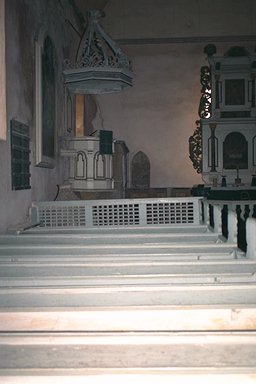
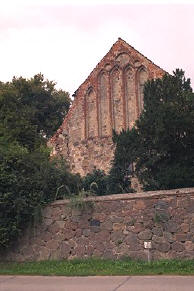 Church
peak Church
peak
Pulpit
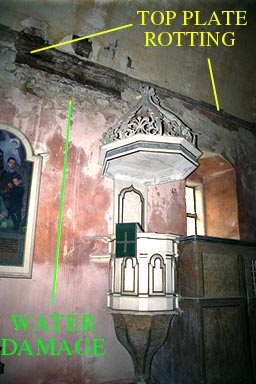
Friday, August 7
We saw pictures of people in the Regional
Museum that were digging into the rubble with smiles on their faces.
And three years after much of the town was destroyed by bombs,
Neubrandenburg had posters up celebrating its 700th anniversary! I
think the Germans have an indomitable spirit.
__________________________________________________________
TNN - RESPONSE FORM - please
fill this out, tear this page off and mail it to us!
(Any financial assistance is appreciated! It
costs $80 to assemble and mail one newsletter)
Information about your Nehrenz family
Ways you can help our efforts (Please send
marked and dated copies of old and new family photos!)
Additions, Corrections for the Nehrenz Roster
(addresses, phone numbers, e-mail addresses)
Your Request for Past TNN Newsletter Issues
(please check )
1995 issue 1_______; issue 2________;1996
issue 1_____; issue 2_____; 1997 issue 1_______ ; 1998 issue 1___;
(send $ for the postage only)
Order Form for “Nine-Generation Deluxe
Nehrenz Family Tree” (includes several hundred people!)
Please send ______ copy(s) at $10.00 a piece
(send check made out to “Dave Nehrenz”)
_________________________
Please Mail To: TNN- Dave Nehrenz 902
Carey Dr. Norman, OK. 73069
or e-mail: nehrenznet@aol.com
(check out the Web Page address on the front
cover top- this issue has also now been added!)
Your Nehrenz Family Connection
Your Name:____________________________Your
Profession/Job/Career: _____________________
Family Members Full Name Date of Birth
Address Other Info
(make Xerox copies of old and new family
photos and attach them with this sheet)
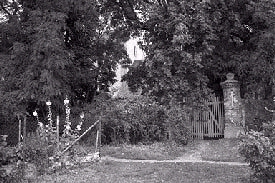
The Garden Gate into the Church Yard
and Cemetery of the Evangelical Lutheran Church inTrollenhagen,
Germany. Our ancestors walked through this gate to attend divine
services! |